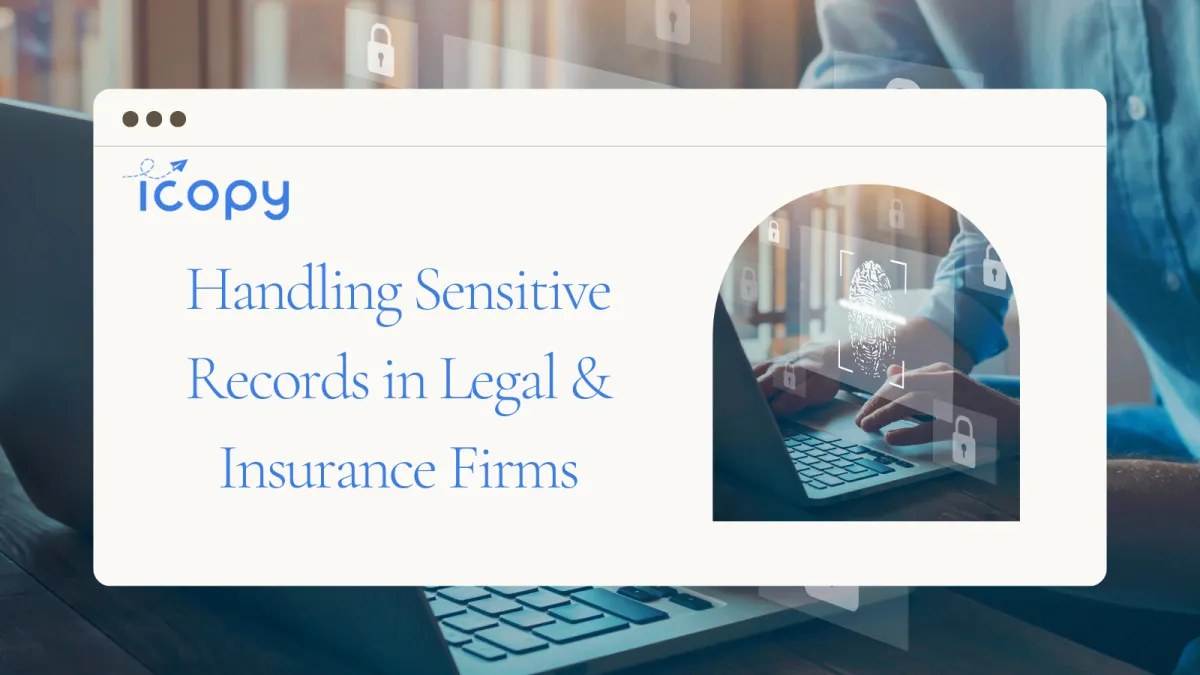Blog
Your inside news on record retrieval for legal firms - plus business tips to help scale your practice.

Compliance and Security: Best Practices for Handling Sensitive Records in Legal and Insurance Firms
Introduction:
In the legal and insurance industries, handling sensitive records with the utmost care is crucial. Ensuring compliance and security is not only a regulatory requirement but also a cornerstone of building trust with clients. At iCopy, we understand the importance of these principles and have implemented industry-leading practices to ensure the highest standards of data protection.

Understanding Regulatory Requirements
The first step in ensuring compliance and security is understanding the relevant regulatory requirements. Legal and insurance firms must adhere to various laws and standards, such as:
HIPAA (Health Insurance Portability and Accountability Act): Governs the protection of health information.
SOC 2 Type II: Sets criteria for managing customer data based on five "trust service principles"—security, availability, processing integrity, confidentiality, and privacy.
Implementing Robust Security Measures
To protect sensitive records, iCopy Legal has implemented robust security measures, including:
Data Encryption: All digital records are encrypted both in transit and at rest, ensuring that even if data is intercepted or accessed without authorization, it remains unreadable and secure.
Access Controls: Access to records is restricted to authorized individuals only. We use multi-factor authentication (MFA) on all accounts, making it nearly impossible for malicious actors to access company accounts.
Intrusion Detection: Our systems are equipped with intrusion detection capabilities, enabling us to act swiftly to recover sensitive data in the event of a breach.
Physical Security: Physical records are kept secured in a locked and restricted area, ensuring they are only accessible to authorized personnel.
Quarterly Audits: We conduct quarterly audits to continuously monitor and improve our security practices.
Regular Security Training
At iCopy, we believe that security is everyone’s responsibility. All employees are trained on security practices and reminded of policies and practices on a monthly basis. This ensures that everyone in our organization understands the importance of data security and knows how to handle sensitive information correctly.
Data Retention and Secure Handling
Sensitive data is only kept for a limited time before being purged, in accordance with data retention policies. Additionally, our processors handle records only on managed, secured systems or virtual machines, adhering to the best security practices.
Ensuring Compliance with Document Management Systems
Using a secure and compliant document management system (DMS) is crucial for handling sensitive records. Here are some key features of our DMS:
Audit Trails: Our DMS maintains detailed audit trails, recording who accessed or modified a document and when. This helps in tracking and monitoring data usage and compliance.
Data Backup and Recovery: Regular data backups and a comprehensive disaster recovery plan ensure that sensitive records can be restored in the event of data loss or a security breach.
Secure Storage: Our DMS offers secure storage solutions, such as encryption and secure cloud storage, to protect sensitive records from unauthorized access and data breaches.
Compliance Features: Our DMS has built-in compliance features that help firms adhere to regulatory requirements, such as data retention policies, e-discovery capabilities, and compliance reporting tools.

Best Practices for Handling Sensitive Records
Minimize Data Collection: Collect only the data that is necessary for your operations. Limiting data collection reduces the risk of exposure and makes compliance management easier.
Regular Audits and Assessments: Conduct regular audits and risk assessments to identify potential vulnerabilities and ensure that security measures are effective and up-to-date.
Data Anonymization: Where possible, anonymize sensitive data to protect the identity of individuals. This is particularly important for data used in research and analysis.
Clear Policies and Procedures: Establish clear policies and procedures for handling sensitive records. This includes guidelines for data storage, access, sharing, and disposal.
Conclusion
Handling sensitive records in legal and insurance firms requires a combination of robust security measures, compliance with regulatory requirements, and best practices in data management. At iCopy, we are committed to implementing these strategies to protect sensitive information, maintain compliance, and build trust with our clients and stakeholders. Ensuring the security and confidentiality of sensitive records is not just a legal obligation but a fundamental aspect of professional integrity in the legal and insurance industries.
Copyright © 2023 iCopy Legal

